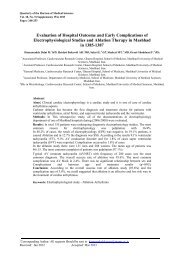- Page 2: ENCYCLOPEDIA OFHEARTDISEASES
- Page 5 and 6: Elsevier Academic Press30 Corporate
- Page 8 and 9: CONTENTSAbout the AuthorPrefaceAckn
- Page 10: CONTENTSixBeriberi Heart Disease 15
- Page 16: ABOUT THE AUTHORDoctor M. Gabriel K
- Page 20: ACKNOWLEDGMENTSI am indebted to res
- Page 23 and 24: 2AGING AND THE HEARTC. Biochemical
- Page 26 and 27: Alcohol and the HeartI. Alcohol and
- Page 28 and 29: VII. TYPE OF ALCOHOL CONSUMPTION7id
- Page 30 and 31: Altitude and Pulmonary EdemaI. Sign
- Page 34 and 35: Anatomy of the Heart and Circulatio
- Page 37 and 38: 16ANATOMY OF THE HEART AND CIRCULAT
- Page 39 and 40: 18ANATOMY OF THE HEART AND CIRCULAT
- Page 41 and 42: 20ANATOMY OF THE HEART AND CIRCULAT
- Page 44: Anderson-Fabry DiseaseGLOSSARYhyper
- Page 49 and 50: 28ANEURYSMCarotidArteryCoronaryArte
- Page 51 and 52: 30ANEURYSMendoleaks. Also biomateri
- Page 53 and 54: 32ANEURYSM2. MRIMRI proved remarkab
- Page 56 and 57: AnginaI. Size of the ProblemII. Pat
- Page 58 and 59: II. PATHOPHYSIOLOGY37TABLE 2Cardiov
- Page 60 and 61: III. DIAGNOSIS39Exertional or emoti
- Page 62 and 63: V. STABLE AND UNSTABLE ANGINA41Anom
- Page 64 and 65: VI. NONDRUG TREATMENT43FIGURE 4A. A
- Page 66 and 67: VII. DRUG TREATMENT45VII. DRUG TREA
- Page 68 and 69: VII. DRUG TREATMENT47Dosage: A subl
- Page 70 and 71: VII. DRUG TREATMENT49patients with
- Page 72 and 73: VII. DRUG TREATMENT51coronary arter
- Page 74 and 75: XI. VARIANT ANGINA (PRINZMETAL’S
- Page 76 and 77: XII. UNSTABLE ANGINA/ACUTE CORONARY
- Page 78 and 79: Angioplasty/Coronary BalloonI. Proc
- Page 80 and 81: IV. OUTCOME OF ANGIOPLASTY59occlusi
- Page 82 and 83: Angiotensin-Converting Enzyme Inhib
- Page 84 and 85: I. ACE INHIBITORS63patients of Asia
- Page 86 and 87: II. ANGIOTENSIN II RECEPTOR BLOCKER
- Page 88: II. ANGIOTENSIN II RECEPTOR BLOCKER
- Page 92 and 93: AntioxidantsI. StatinsII. Vitamin E
- Page 94 and 95: IV. BETA-CAROTENE73low doses of dif
- Page 96:
VIII. PROBUCOL75high-fat meal, a fi
- Page 100 and 101:
Antiplatelet AgentsI. Mechanism of
- Page 102 and 103:
III. AVAILABLE ANTIPLATELET AGENTS8
- Page 104:
III. AVAILABLE ANTIPLATELET AGENTS8
- Page 108 and 109:
Arrhythmias/PalpitationsI. Origin o
- Page 110 and 111:
III. TACHYCARDIA89attacks, sudden c
- Page 112 and 113:
III. TACHYCARDIA91V1V4V2V5V3V6FIGUR
- Page 114 and 115:
III. TACHYCARDIA93individuals who h
- Page 116 and 117:
IV. ANTIARRHYTHMIC AGENTS95FIGURE 7
- Page 118 and 119:
IV. ANTIARRHYTHMIC AGENTS97V 1V 2V
- Page 120 and 121:
IV. ANTIARRHYTHMIC AGENTS99FIGURE 1
- Page 122 and 123:
ArteriosclerosisI. Diseases Causing
- Page 124:
II. ATHEROSCLEROSIS103The intima of
- Page 127 and 128:
106ARTIFICIAL HEARTa contract progr
- Page 129 and 130:
108ARTIFICIAL HEARTbridged to trans
- Page 131 and 132:
110ARTIFICIAL HEARTJessup, M. Mecha
- Page 133 and 134:
112ASPIRIN FOR HEART DISEASED. John
- Page 135 and 136:
114ASPIRIN FOR HEART DISEASEFIGURE
- Page 138 and 139:
Atherosclerosis/AtheromaI. Introduc
- Page 140 and 141:
II. PATHOLOGY119Outerwall= ADVENTIT
- Page 142 and 143:
III. PATHOGENESIS121status in women
- Page 144 and 145:
III. PATHOGENESIS123LDLturbulence o
- Page 146 and 147:
III. PATHOGENESIS125upregulation of
- Page 148 and 149:
V. CLINICAL STUDIES127IV. VULNERABL
- Page 150 and 151:
VI. PERSPECTIVE AND RESEARCH IMPLIC
- Page 152 and 153:
Athletes and Sudden Cardiac DeathI.
- Page 154 and 155:
I. CARDIAC CAUSES OF SUDDEN DEATH I
- Page 156 and 157:
II. SUDDEN DEATH NOT ASSOCIATED WIT
- Page 158:
III. ATHLETE’S HEART VERSUS HYPER
- Page 161 and 162:
140ATRIAL FIBRILLATIONSinus nodepac
- Page 163 and 164:
142ATRIAL FIBRILLATIONThe preventio
- Page 165 and 166:
144ATRIAL FIBRILLATIONFIGURE 3AAtri
- Page 167 and 168:
146ATRIAL FIBRILLATIONximelagatran
- Page 169 and 170:
148ATRIAL FIBRILLATIONsick sinus sy
- Page 171 and 172:
150ATRIAL FIBRILLATIONOzcan, C., Ja
- Page 173 and 174:
152ATRIAL SEPTAL DEFECTFIGURE 1 Tra
- Page 175 and 176:
154B-TYPE NATRIURETIC PEPTIDEAorta*
- Page 178:
Beriberi Heart DiseaseI. Clinical M
- Page 181 and 182:
160BETA-BLOCKERSheart muscle and in
- Page 183 and 184:
162BETA-BLOCKERSTotal patientpopula
- Page 185 and 186:
164BETA-BLOCKERSgroups. The first g
- Page 187 and 188:
166BETA-BLOCKERSand in patients wit
- Page 190 and 191:
Blood ClotsI. Causes of Blood Clots
- Page 192 and 193:
III. DRUG TREATMENT171The ASSENT-2
- Page 194 and 195:
III. DRUG TREATMENT1733. Interactio
- Page 196 and 197:
Blood PressureI. Historical ReviewI
- Page 198 and 199:
I. HISTORICAL REVIEW177FIGURE 3 A l
- Page 200 and 201:
IV. NORMAL FLUCTUATIONS IN BLOOD PR
- Page 202:
VII. EFFECTS OF HIGH BLOOD PRESSURE
- Page 205 and 206:
184BRUGADA SYNDROMEsyndrome is a di
- Page 207 and 208:
186BUNDLE BRANCH BLOCKB. Causes of
- Page 210 and 211:
Caffeine and the HeartI. Biochemist
- Page 212:
II. EFFECTS1916. CholesterolChronic
- Page 215 and 216:
194CALCIUM ANTAGONISTSTABLE 1Hemody
- Page 217 and 218:
196CALCIUM ANTAGONISTSsinus and AV
- Page 220 and 221:
Carcinoid Heart DiseaseI. Heart Dam
- Page 222 and 223:
Cardiogenic ShockI. CausesII. Patho
- Page 224 and 225:
CardiomyopathyI. Hypertrophic Cardi
- Page 226 and 227:
I. HYPERTROPHIC CARDIOMYOPATHY205To
- Page 228 and 229:
II. SUDDEN DEATH207D. Pathophysiolo
- Page 230 and 231:
III. DILATED CARDIOMYOPATHY209patie
- Page 232 and 233:
V. SPECIFIC HEART MUSCLE DISEASE211
- Page 234:
V. SPECIFIC HEART MUSCLE DISEASE213
- Page 237 and 238:
216CARDIOPULMONARY RESUSCITATION (C
- Page 239 and 240:
218CARDIOPULMONARY RESUSCITATION (C
- Page 241 and 242:
220CARDIOPULMONARY RESUSCITATION (C
- Page 243 and 244:
222CARDIOPULMONARY RESUSCITATION (C
- Page 245 and 246:
224CHAGAS DISEASEFIGURE 1 Distribut
- Page 248 and 249:
Chelation and Heart DiseaseI. Clini
- Page 250 and 251:
Chemotherapy-Induced Heart DiseaseI
- Page 252 and 253:
IV. 5-FLUOROURACIL231Dexrazoxane is
- Page 254 and 255:
CholesterolI. The Magnitude of the
- Page 256 and 257:
III. CAUSES OF HYPERCHOLESTEROLEMIA
- Page 258 and 259:
IV. TYPES OF CHOLESTEROL237such as
- Page 260 and 261:
IV. TYPES OF CHOLESTEROL239600 (305
- Page 262 and 263:
V1. CORONARY ARTERY DISEASE RISK241
- Page 264 and 265:
VII. DIETS AND CHOLESTEROL243TABLE
- Page 266 and 267:
VIII. CHOLESTEROL-LOWERING DRUGS245
- Page 268 and 269:
Coenzyme Q10I. ActionsII. Clinical
- Page 270:
III. PROSPECTIVE AND RESEARCH IMPLI
- Page 273 and 274:
252CONGENITAL HEART DISEASE3. Hypop
- Page 275 and 276:
254CONGENITAL HEART DISEASEabnormal
- Page 277 and 278:
256CONGENITAL HEART DISEASEThe orig
- Page 279 and 280:
258CONGENITAL HEART DISEASEFIGURE 4
- Page 281 and 282:
260CONGENITAL HEART DISEASEFIGURE 5
- Page 284 and 285:
Contraception and Cardiovascular Di
- Page 286:
I. ORAL CONTRACEPTIVES265indicates
- Page 289 and 290:
268CORONARY ARTERY BYPASS SURGERYII
- Page 291 and 292:
270CORONARY ARTERY BYPASS SURGERYIV
- Page 293 and 294:
272CORONARY ARTERY BYPASS SURGERYar
- Page 295 and 296:
274CORONARY ARTERY BYPASS SURGERYsh
- Page 298 and 299:
C-Reactive Protein and the HeartI.
- Page 300 and 301:
III. PERSPECTIVE AND RESEARCH IMPLI
- Page 302 and 303:
Cytochrome P-450I. Definition and N
- Page 304 and 305:
IV. P- 450s AND CARDIOVASCULAR DRUG
- Page 306:
IV. P- 450s AND CARDIOVASCULAR DRUG
- Page 309 and 310:
288DEEP VEIN THROMBOSISsimilar to v
- Page 311 and 312:
290DEEP VEIN THROMBOSISapproximatel
- Page 313 and 314:
292DEPRESSION AND THE HEARTand majo
- Page 315 and 316:
294DIABETES AND CARDIOVASCULAR DISE
- Page 317 and 318:
296DIABETES AND CARDIOVASCULAR DISE
- Page 319 and 320:
298DIABETES AND CARDIOVASCULAR DISE
- Page 321 and 322:
300DIABETES AND CARDIOVASCULAR DISE
- Page 323 and 324:
302DIABETES AND CARDIOVASCULAR DISE
- Page 325 and 326:
304DIABETES AND CARDIOVASCULAR DISE
- Page 327 and 328:
306DIABETES AND CARDIOVASCULAR DISE
- Page 329 and 330:
308DIETS AND HEART DISEASEwas assoc
- Page 331 and 332:
310DIETS AND HEART DISEASEabsolute
- Page 333 and 334:
312DIETS AND HEART DISEASEnutrition
- Page 335 and 336:
314DIURETICSII. RENAL PHYSIOLOGYFig
- Page 337 and 338:
316DIURETICSare more closely aggreg
- Page 339 and 340:
318DIURETICSwith a mild decrease in
- Page 342 and 343:
DyslipidemiaI. LipoproteinsGLOSSARY
- Page 344 and 345:
I. LIPOPROTEINS323LDL cholesterol i
- Page 346 and 347:
I. LIPOPROTEINS325randomized to a d
- Page 348 and 349:
EchocardiographyI. HistoricalII. In
- Page 350 and 351:
IV. CLINICAL APPLICATIONS329with th
- Page 352 and 353:
IV. CLINICAL APPLICATIONS331FIGURE
- Page 354:
VI. NEW FRONTIERS333VI. NEW FRONTIE
- Page 357 and 358:
336EFFECTS OF SMOKING AND HEART DIS
- Page 359 and 360:
338EFFECTS OF SMOKING AND HEART DIS
- Page 362 and 363:
ElectrocardiographyI. HistoricalII.
- Page 364 and 365:
IV. DIAGNOSIS OF SPECIFIC CONDITION
- Page 366 and 367:
IV. DIAGNOSIS OF SPECIFIC CONDITION
- Page 368 and 369:
IV. DIAGNOSIS OF SPECIFIC CONDITION
- Page 370 and 371:
V. RECENT DISCOVERIES349FIGURE 12EC
- Page 372:
V. RECENT DISCOVERIES351FIGURE 14 H
- Page 375 and 376:
354EMBRYOLOGYmesoderm of the perica
- Page 377 and 378:
356EMBRYOLOGYTABLE 2ContinuedAndrog
- Page 380 and 381:
EndocarditisI. Definition and Sites
- Page 382:
IV. PREVENTION3612 g one hour prior
- Page 385 and 386:
364ENDOCRINE DISORDERS AND THE HEAR
- Page 388 and 389:
Erectile Dysfunction and the HeartI
- Page 390 and 391:
III. MANAGEMENT369the penis. The si
- Page 392 and 393:
III. MANAGEMENT371TABLE 1ContinuedI
- Page 394:
III. MANAGEMENT373significantly pro
- Page 397 and 398:
376EXERCISE AND THE HEARTand euphor
- Page 399 and 400:
378EXERCISE AND THE HEARTuses only
- Page 401 and 402:
380EXERCISE AND THE HEARTin the liv
- Page 403 and 404:
382EXERCISE AND THE HEARTThere is u
- Page 405 and 406:
384EXERCISE AND THE HEARTrate of fo
- Page 407 and 408:
386EXERCISE AND THE HEARTthree or f
- Page 409 and 410:
388EXERCISE AND THE HEARTFIGURE 4 S
- Page 412 and 413:
Gene TherapyI. StrategiesII. Clinic
- Page 414 and 415:
II. CLINICAL APPLICATION393TABLE 1G
- Page 416:
IV. ADVERSE OUTCOMES395take origin
- Page 419 and 420:
398HEART ATTACKSunits in the early
- Page 421 and 422:
400HEART ATTACKSoccasionally is the
- Page 423 and 424:
402HEART ATTACKSFIGURE 3Common loca
- Page 425 and 426:
404HEART ATTACKSpain of a heart att
- Page 427 and 428:
406HEART ATTACKSA. Indigestion and
- Page 429 and 430:
408HEART ATTACKSyou immediately to
- Page 431 and 432:
410HEART ATTACKS(ventricular fibril
- Page 433 and 434:
412HEART ATTACKSV1V4V2V5V3V6FIGURE
- Page 435 and 436:
414HEART ATTACKSV1V4V1V4V2V5V2V5V3V
- Page 437 and 438:
416HEART ATTACKSimproved when an as
- Page 439 and 440:
418HEART ATTACKSpresence of elevate
- Page 441 and 442:
420HEART ATTACKSis strongly indicat
- Page 443 and 444:
422HEART ATTACKSdiseases, and type
- Page 445 and 446:
424HEART ATTACKStraction; therefore
- Page 447 and 448:
426HEART ATTACKSdiscontinued and th
- Page 449 and 450:
428HEART ATTACKSage 25. The advice
- Page 451 and 452:
430HEART ATTACKSreactivity of plate
- Page 454 and 455:
Heart FailureI. Incidence and Patho
- Page 456 and 457:
III. PRECIPITATING FACTORS435infarc
- Page 458 and 459:
V. SYMPTOMS AND SIGNS437FIGURE 2Pat
- Page 460 and 461:
VII. DRUG TREATMENT439TABLE 1Echoca
- Page 462 and 463:
VII. DRUG TREATMENT4411. Actions of
- Page 464 and 465:
VII. DRUG TREATMENT44332% ( p ¼ 0.
- Page 466 and 467:
IX. WHAT TO EXPECT IN THE HOSPITAL
- Page 468:
IX. WHAT TO EXPECT IN THE HOSPITAL
- Page 471 and 472:
450HEMOCHROMATOSISIII. CLINICAL COM
- Page 474 and 475:
Herbal, Dietary Supplements, andCar
- Page 476 and 477:
III. BENEFITS, ADVERSE EFFECTS, AND
- Page 478 and 479:
III. BENEFITS, ADVERSE EFFECTS, AND
- Page 480 and 481:
III. BENEFITS, ADVERSE EFFECTS, AND
- Page 482:
IV. SUBSTANCES USED BY ATHLETES461g
- Page 485 and 486:
464HIV AND THE HEARTPericardial eff
- Page 487 and 488:
466HOMOCYSTEINE AND CARDIOVASCULAR
- Page 489 and 490:
468HOMOCYSTEINE AND CARDIOVASCULAR
- Page 491 and 492:
470HYPERTENSIONwithin the cuff is b
- Page 493 and 494:
472HYPERTENSIONTABLE 1Classificatio
- Page 495 and 496:
474HYPERTENSIONhemorrhage), spinal
- Page 497 and 498:
476HYPERTENSIONFIGURE 3 Other hypot
- Page 499 and 500:
478HYPERTENSION Either the blood ur
- Page 501 and 502:
480HYPERTENSIONE. AlcoholThere is c
- Page 503 and 504:
482HYPERTENSIONthan others (see the
- Page 505 and 506:
484HYPERTENSIONTABLE 6Generic and T
- Page 507 and 508:
486HYPERTENSIONThe patient’s past
- Page 509 and 510:
488HYPERTENSION4. Calcium Antagonis
- Page 511 and 512:
490HYPERTENSIONis now reserved for
- Page 514 and 515:
Hypertrophy of the HeartI. Pathophy
- Page 516 and 517:
III. DIAGNOSIS495It is unclear whet
- Page 518 and 519:
IV. PREVENTION AND MANAGEMENT497V1V
- Page 520:
IV. PREVENTION AND MANAGEMENT499b.
- Page 523 and 524:
502KAWASAKI HEART DISEASEartery ane
- Page 526 and 527:
Miscellaneous DisordersI. Marfan Sy
- Page 528 and 529:
XII. PSEUDOXANTHOMA ELASTICUM507of
- Page 530:
XVIII. ATRIAL MYXOMA509XVI. SARCOID
- Page 533 and 534:
512MURMURS AND HEART DISEASEwill do
- Page 535 and 536:
514MURMURS AND HEART DISEASEthan th
- Page 537 and 538:
516NONSTEROIDAL ANTI-INFLAMMATORY D
- Page 540 and 541:
Obesity and Heart DiseaseI. Inciden
- Page 542 and 543:
III. MANAGEMENT521II. EFFECTS ON TH
- Page 544 and 545:
IV. CLINICAL STUDIES OF DIETS523pro
- Page 546 and 547:
PacemakersI. HistoricalII. Complete
- Page 548 and 549:
II. COMPLETE HEART BLOCK527per minu
- Page 550 and 551:
V. PERMANENT PACEMAKERS529pacemaker
- Page 552 and 553:
V. PERMANENT PACEMAKERS531or thromb
- Page 554 and 555:
Patent Foramen OvaleI. Developmenta
- Page 556 and 557:
III. PROOF OF PFO INVOLVEMENT IN ST
- Page 558:
IV. PERSPECTIVE AND RESEARCH IMPLIC
- Page 561 and 562:
540PERICARDITIS AND MYOCARDITISbeat
- Page 564 and 565:
Pulmonary Arterial HypertensionI. P
- Page 566 and 567:
II. PRIMARY PULMONARY HYPERTENSION5
- Page 568 and 569:
II. PRIMARY PULMONARY HYPERTENSION5
- Page 570 and 571:
Pulmonary EmbolismI. IncidenceII. P
- Page 572:
VI. MANAGEMENT551the diagnosis. Oth
- Page 575 and 576:
554RACE AND CARDIOVASCULAR DISEASEc
- Page 577 and 578:
556RACE AND CARDIOVASCULAR DISEASEO
- Page 580 and 581:
Sleep and the HeartI. Effects of No
- Page 582 and 583:
III. SLEEP APNEA AND HEART FAILURE5
- Page 584:
V. SLEEP APNEA AND ARRHYTHMIAS563IV
- Page 587 and 588:
566STENTSarteries is 20-30% in shor
- Page 589 and 590:
568STENTSLong-term drug toxicity mu
- Page 591 and 592:
570STRESS AND HEART DISEASEFIGURE 1
- Page 593 and 594:
572STRESS AND HEART DISEASE Achines
- Page 596 and 597:
Stroke/Cerebrovascular AccidentI. I
- Page 598 and 599:
IV. TRANSIENT ISCHEMIC ATTACK577IV.
- Page 600:
VI. SUBARACHNOID HEMORRHAGE579Johns
- Page 603 and 604:
582SYNCOPETachyarrhythmiasBradyarrh
- Page 605 and 606:
584SYNCOPEdisease where there is fa
- Page 607 and 608:
586SYNCOPEE. Electrophysiologic Tes
- Page 609 and 610:
588SYNCOPEBIBLIOGRAPHYCalkins, H.,
- Page 611 and 612:
590TESTS FOR HEART DISEASESvery hel
- Page 613 and 614:
592TESTS FOR HEART DISEASESThe puls
- Page 615 and 616:
594TESTS FOR HEART DISEASESplaque i
- Page 618 and 619:
Thyroid Heart DiseaseI. High Thyroi
- Page 620 and 621:
Valve DiseasesI. MurmursII. Causes
- Page 622 and 623:
IV. SPECIFIC VALVE LESIONS601Not al
- Page 624 and 625:
IV. SPECIFIC VALVE LESIONS603common
- Page 626 and 627:
V. PROSTHETIC VALVE CHOICE605FIGURE
- Page 628 and 629:
Ventricular FibrillationI. Clinical
- Page 630 and 631:
Women and Heart DiseaseI. Relevant
- Page 632 and 633:
III. HORMONE THERAPY611maximal hear
- Page 634 and 635:
IV. PREGNANCY AND HEART DISEASE613a
- Page 636:
IV. PREGNANCY AND HEART DISEASE615H
- Page 639 and 640:
618APPENDIX AGenericBeta-Blockers.
- Page 642 and 643:
GLOSSARYAACE angiotensin-converting
- Page 644 and 645:
GLOSSARY623embryo developing human
- Page 646 and 647:
GLOSSARY625preload the degree of ve
- Page 648 and 649:
INDEXAbciximab, as antiplatelet age
- Page 650 and 651:
INDEX629mechanism of action, 65Anky
- Page 652 and 653:
INDEX631Atrial premature beats, dia
- Page 654 and 655:
INDEX633in loss of consciousness, 2
- Page 656 and 657:
INDEX635aortic stenosis, 254bicuspi
- Page 658 and 659:
INDEX637Dissecting aneurysm, beta-b
- Page 660 and 661:
INDEX639blood effects, 382-383blood
- Page 662 and 663:
INDEX641transplantation, 444vitamin
- Page 664 and 665:
INDEX643Hypertriglyceridemiacharact
- Page 666 and 667:
INDEX645MMacrophage-colony stimulat
- Page 668 and 669:
INDEX647Oxidation, LDL, 337Oxygenin
- Page 670 and 671:
INDEX649Regional angiogenesis with
- Page 672 and 673:
INDEX651management, 586-587from ort
- Page 674:
INDEX653WWall tension, 27Warfarinfo
















